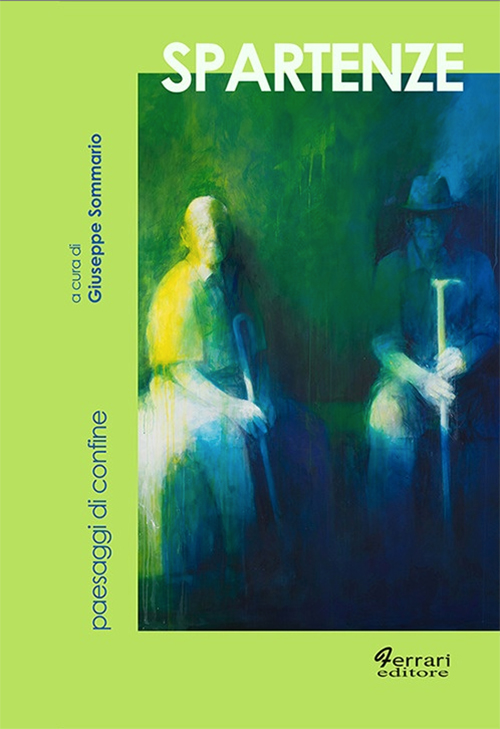Paolo Frascà spoke at an event in Italy this summer with a group of scholars, many of whom had something in common — they’re from Italy, most from the South, and left their native country to pursue academic careers elsewhere.
“Many of us didn't grow up wanting to leave our homeland,” says Frascà, an assistant professor, teaching stream in the Faculty of Arts & Science’s Department of Italian Studies. “Many of us struggle with loss, nostalgia and all the emotions that come with migration.”
Frascà spoke at an event hosted by Italian Senator Ernesto Rapani at the Palazzo Giustiniani (the Italian Senate) in Rome, in July about his ongoing research on Italian migration and its relationship to colonialism, and on sexual and gender diversity in Italy and in the Italian diaspora.

This group of scholars from a wide range of disciplines who are now working in France, the U.K., China, the U.S. and other countries, originally contributed essays to a book called Spartenze: paesaggi di confine, edited by Giuseppe Sommario (Università Cattolica di Milano)
“‘Spartenza’ is a word with a number of meanings — departure, division, resilience, abandonment,” says Frascà. “It's a concept that encapsulates various affective experiences related to migration, movement and leaving one's homeland.
“The book is a collection of contributions by mostly southern Italians from Calabria — which is where I’m from — who work in research and academia abroad, or in other parts of Italy. What is interesting is that, often, southern Italians who move to other parts of Italy are seen or even refer to themselves as migrants.”
Because of the possible intersections between lived experience and academic work, the question posed to contributors was: “how do you apply the idea of spartenza to your own research?”
Speaking to an audience of academics and high-level politicians, Frascà stepped up to the podium and discussed his current research on Italian migration to Canada, as well as the intersections of race, ethnicity and sexuality.

“The topic of young people leaving Italy is of great interest to the Italian government because emigration is a major demographic, and therefore a political issue,” he says. “There's a phenomenon labeled fuga dei cervelli or ‘flight of the brains,’ which refers to highly educated Italians leaving because of the scarcity of professional opportunities in Italy.”
Frascà also delved into history, touching on some of his research with respect to the colonization of the Americas. “The entire continent is named after an explorer and cartographer from the Italian peninsula, Amerigo Vespucci,” notes Frascà. “And colonial figures connected to Italy such as Vespucci, Columbus and Caboto have played an important role in the collective imaginary of Italian diasporas in what we now call the Americas.” (For more information on this topic, see the Indigenous-Italian-Canadian Connections digital humanities platform.)
Frascà also discussed sexual orientation and gender identity as important factors or even motivators for leaving one’s place of origin. On the intersection of sexual diversity and migration, he shared insights from the Queer Italian-Canadian Artists: Ethnic Belonging and Cultural Production SSHRC-funded project, which studies the lived experiences and creative products of queer Italian-Canadians.
For Italian immigrants and their descendants who are queer, the migration path is still strewn with challenges as “queerness often does not fall within the ideal path to Canadian citizenship for migrants, of having ‘made it’ here,” says Frascà. It sometimes clashes with outdated views of “becoming a good Italian-Canadian.”
And such challenges could also be found centuries ago, when the first Europeans arrived in North America.
“I also talked about the fact that the colonization of the Americas by Europeans used the regulation of sexuality and gender roles as a colonial tool,” says Frascà. “When we read writings by Christian missionaries about Indigenous peoples in Canada, for example, part of their dehumanization had to do with gender roles that appeared skewed to Europeans. So I talked about the fact that there are nations and communities in what is now called Canada that have known sexual and gender diversity long before Europeans or contemporary movements for queer liberation arrived.”

Frascà finished his address focusing on southern Italian identity: “Southern Italians are still, at times, not considered Italian enough,” exploring some historical ethnic and gender/sexual stereotypes related to the discrimination of southern Italians. Through this final point, he wanted to draw a connection between southern Italian identity, migration and queerness.
Speaking at the Italian senate for the first time, Frascà deeply appreciated the opportunity to participate in this prestigious event and felt a strong connection to many of his fellow scholars.
“It was fascinating and empowering in a number of ways,” he says. “It was really interesting to connect with them and notice some of the common trends in our research.
“But there was also a sense of sadness knowing we’ve all had to leave our homeland in order to succeed in the ways that we have, as academics, and in our personal lives.
“Still, I felt really privileged. I couldn't believe I was at this event, considering the venue and the topics discussed. It was a really effective way to use my platform as an academic in the more public and political realm, especially given the legislative power held by some of the attendees. I am proud of the ways that research — particularly in the humanities and in what we call ‘language and culture departments’ — can impact social and political conversations.”

